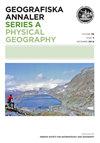利用放射性尘埃137Cs和OSL作为荒地沉积物示踪剂:以墨西哥中部tepezal火山为例
IF 1.8
4区 地球科学
Q3 GEOGRAPHY, PHYSICAL
Geografiska Annaler Series A-Physical Geography
Pub Date : 2023-01-02
DOI:10.1080/04353676.2023.2171999
引用次数: 0
摘要
荒地是造成大面积土壤流失的动态地貌。在这项研究中,我们使用了一种新的方法,将放射性尘埃137Cs和光学激发发光(OSL)结合起来,分析了荒地地区最近的沉积物动员。我们评估了位于墨西哥中部的tepezal本文章由计算机程序翻译,如有差异,请以英文原文为准。
Using fallout 137Cs and OSL as sediment tracers in badlands: a case study of Tepezalá volcano (Central Mexico)
ABSTRACT Badlands are dynamic landforms that cause soil loss over extensive areas. In this study, we analyze recent sediment mobilization in a badland area by using a novel approach that integrates fallout 137Cs and optically stimulated luminescence (OSL). We assess how erosion and sediment storage operate over the Tepezalá volcano, a tephra cone located in central Mexico. We analyzed a set of sediment samples extracted from the surface of an altitudinal sequence with different land uses to explore how landscape management practices relate to erosion and, depth profiles from local sinks, to detect patterns of sediment mobilization and sedimentation. We compared 137Cs and OSL results with reference values to evaluate whether erosion or deposition is predominant and to assess how deep the erosive processes in the landscape are. Results from fallout 137Cs values indicate that in those badlands with implemented actions to mitigate erosion, sediment is retained. The high luminescence values show that the edaphic soil has been flushed away, and subsoil crops out in some of the sampled sites. For the case of depth profiles, maximum values of 137Cs coincide with high luminescence values, suggesting that in such sites, the sediment was mobilized during rapid incision episodes that caused widespread erosion of the landscape. We detected at least three episodes of rapid incision in 10 years of sediment record. We propose that using 137Cs and OSL together can provide valuable information of the sediment transport in settings dominated by fast erosion as do occur for the case of badlands.
求助全文
通过发布文献求助,成功后即可免费获取论文全文。
去求助
来源期刊
CiteScore
3.60
自引率
0.00%
发文量
12
审稿时长
>12 weeks
期刊介绍:
Geografiska Annaler: Series A, Physical Geography publishes original research in the field of Physical Geography with special emphasis on cold regions/high latitude, high altitude processes, landforms and environmental change, past, present and future.
The journal primarily promotes dissemination of regular research by publishing research-based articles. The journal also publishes thematic issues where collections of articles around a specific themes are gathered. Such themes are determined by the Editors upon request. Finally the journal wishes to promote knowledge and understanding of topics in Physical Geography, their origin, development and current standing through invited review articles.

 求助内容:
求助内容: 应助结果提醒方式:
应助结果提醒方式:


